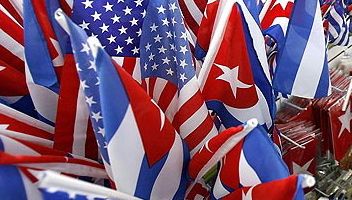
A quick view of the Cuba poll results
HAVANA TIMES — Professors Guillermo Grenier and Hugh Gladwin of Florida International University set out to answer that question once again in the newest edition of the unique survey they have periodically conducted over the past 20 years, involving 1000 Cuban Americans in Miami-Dade county famous for its hardline stance against Cuba’s government, intolerance of reasonable voices, and open arms to terrorists “for the cause”.
This issue confirms a continuing trend toward moderation among the target population and an expected gap in opinion between the newcomers (arriving after 1994), young adults (18-29 years), and second-generation Cuban-Americans, and the traditional “exiles.”
This trend has reached a tipping point making the county’s representatives in the nation’s capital out of sync with their constituents, with the exception of Rep. Garcia (D) – to a certain degree.
The overall findings were:
All Respondents Young Adults Newcomers
For ending the embargo 52% 62% 58%
For diplomatic relations 68% 90% 80%
For freedom to travel 69% 89% 80%
Most importantly, the poll lays bare the need for Cuban Americans under 30 years old, as well as those arriving in the past two decades, to get registered and to participate in the election process in order to make these numbers meaningful.
Consider the poll’s findings that:
- Registered voters are split on the embargo question, while young adults clearly oppose it.
- 83% of those NOT registered to vote want renewed diplomatic ties, compared to 55% of registered voters.
- While 58% of registered voters support everyone’s right to travel to Cuba, it is a far cry from the 89% of young Cuban Americans who oppose the travel ban.
The consequences of the low rate of voter registration among younger Cuban Americans is also pronounced in the case of Cuba’s inclusion on the U.S. State Department’s list of State Sponsors of Terrorism, which entails a second layer of sanctions against Cuba: 65% of young adults polled think Cuba should be taken off of the list, but only 30% of responding registered voters agree.
This poll suggests that the most important and permanent means for effecting positive change in US policy toward Cuba is registering and mobilizing voters in Miami-Dade county. Although Obama proved that the Cuban-American vote is not essential for winning the White House and Hillary Clinton (presumed 2016 presidential candidate) has recently followed Florida’s current gubernatorial candidate Charlie Crist in declaring opposition to the embargo, Congressional elections are just as important.
In fact they may be more important considering that much of U.S. policy toward Cuba is codified in Congressional law. Rep. Ros-Lehtinen (R) uses her position of seniority to bully colleagues into opposing engagement with Cuba and Sen. Rubio (R-FL) threatens to block presidential nominations and use the filibuster to perpetuate the U.S.-Cuba stalemate. In addition, local allies like Rep. Wasserman-Shultz (D) do not hesitate to use their party’s elections structure to wield carrot-and-stick control over fellow policy-makers and candidates.
At the Congressional level one might expect elections to be more responsive to constituent opinion. However, even though 57% of registered voters told this poll that they would vote for a candidate “who supports replacing the embargo with a policy that increases support for independent business owners in Cuba”, lawmakers who disagree with this sentiment 100% have been elected and re-elected term after term.
This leads to a few questions I’d like to see the pollsters add to their next round of phone calls:
For registered voters:
How important is a candidate’s stand on Cuba policy to your vote choice?
For respondents not registered to vote:
Is there a reason you have decided not to participate in voting?
Can I come to your house right now and personally register you?
(From Havana Times)


